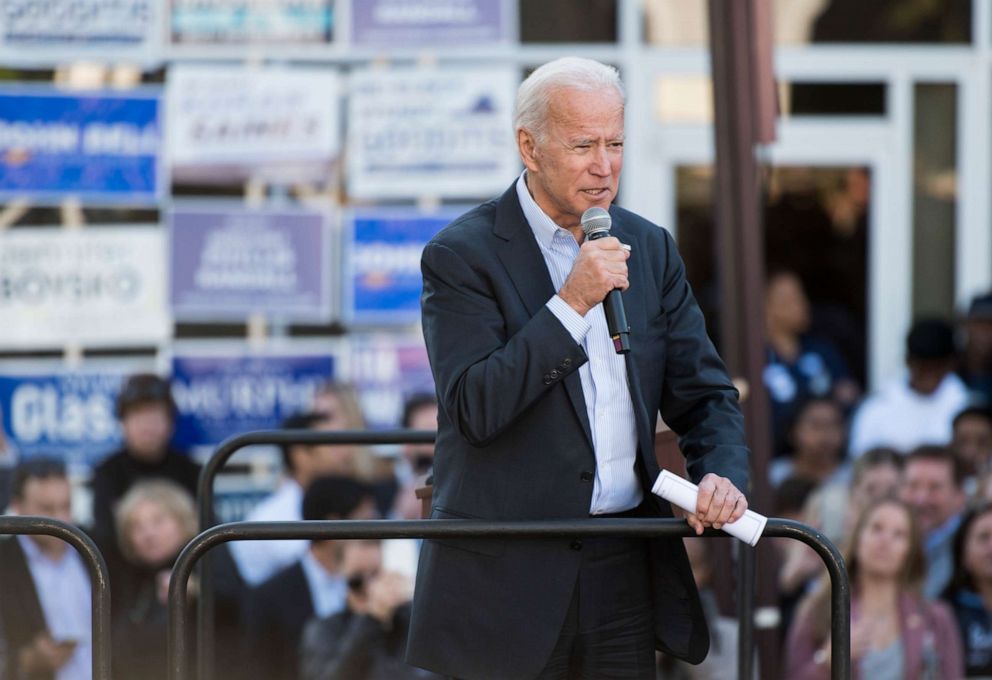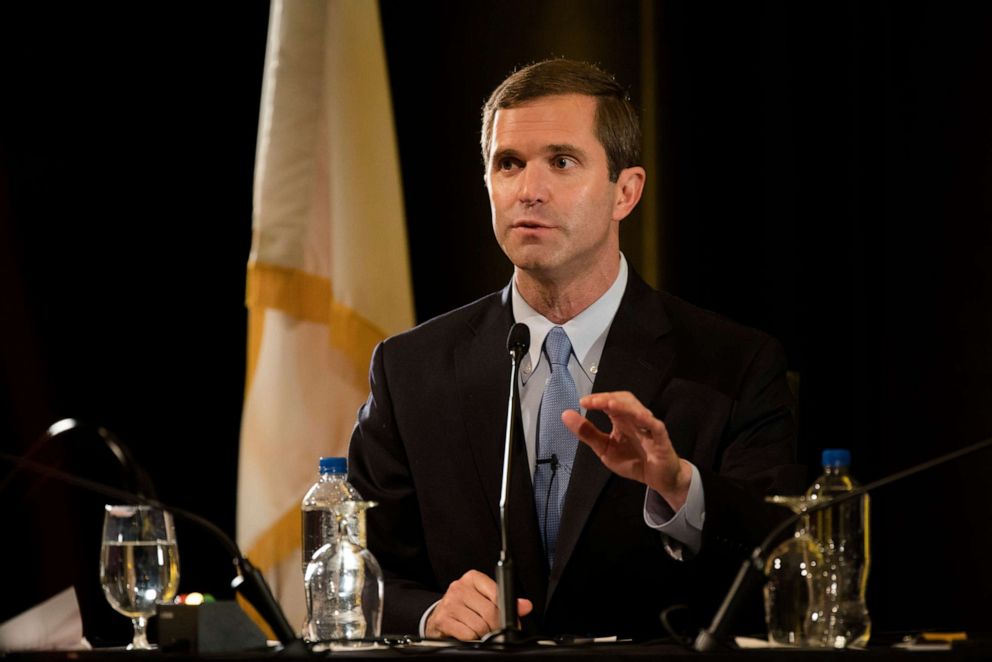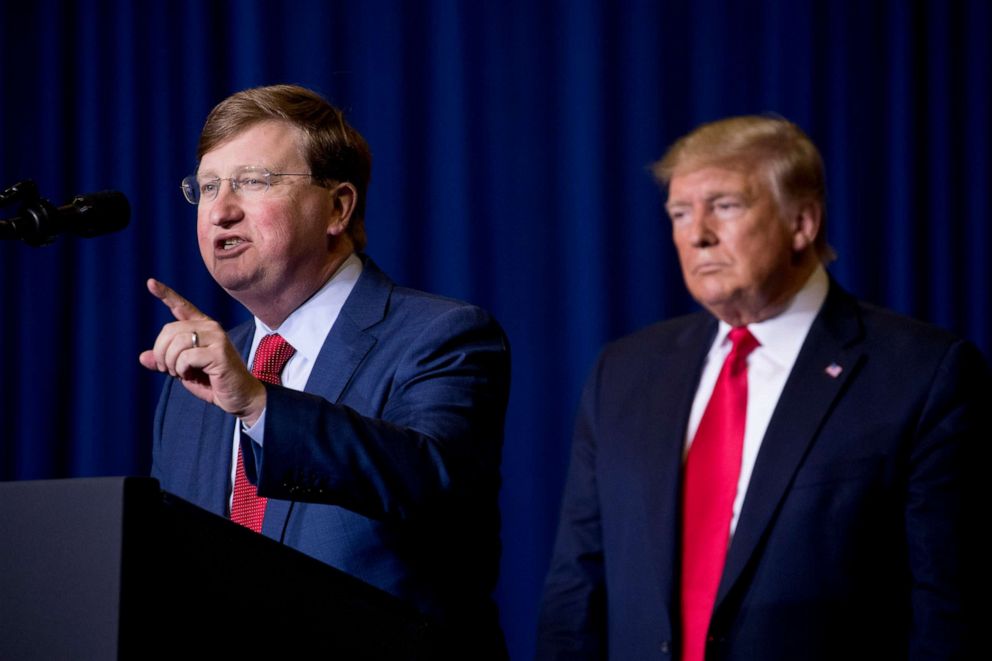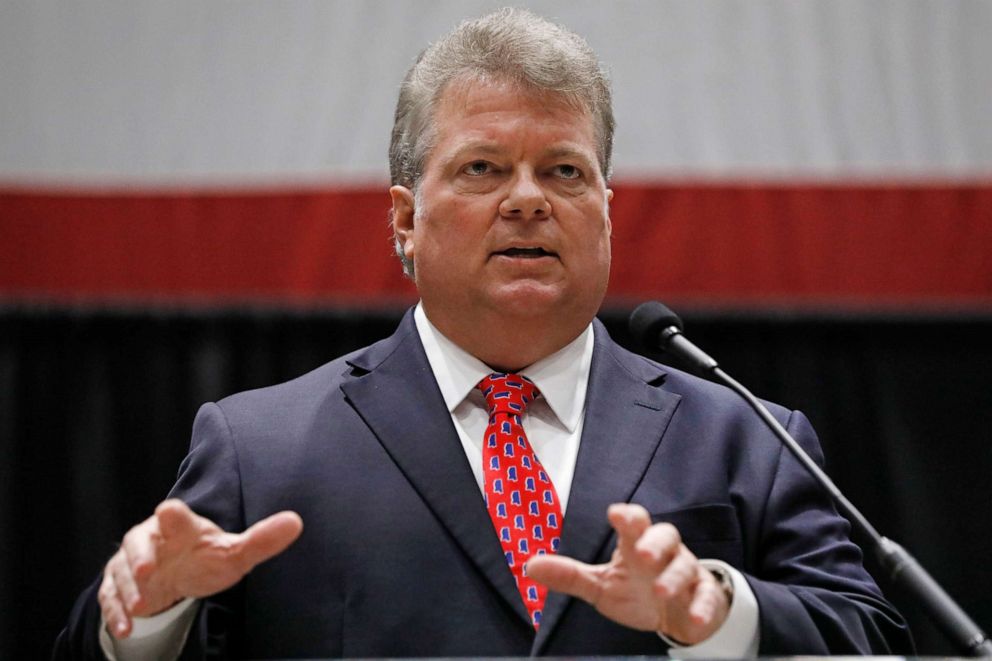Tuesday’s elections in Kentucky, Mississippi and Virginia test the political waters ahead of 2020
Voters head to the polls in Kentucky, Mississippi and Virginia's key elections.
Outside a local Democratic headquarters in Virginia, former Vice President Joe Biden took his presidential campaign to a parking lot in Loudoun County on Sunday afternoon to stump for a roster of down ballot candidates ahead of Tuesday's crucial legislative elections across the commonwealth -- part of a multi-state effort among national Democrats to expand their influence before 2020.
Biden outlined the stakes of the races before local Democrats, which included some residents of neighboring Maryland and Washington, D.C., suggesting Tuesday will set the course for 2020.
"Whether we get rid of the most corrupt administration in American history -- a guy who has literally sullied the soul of the country -- is going to depend on what happens here because the rest of the world, the rest of the nation is watching you. In Virginia, turn Virginia all blue," he said.
"You’ll determine what is going to happen in 2020," he urged.
The off-year elections in Virginia, a year before an unsettled presidential contest, should be a respite from the gravitational pull of the high-stakes 2020 campaign, but with control of the state legislature on the line for the first time in years and two surprisingly competitive gubernatorial races in Kentucky and Mississippi all on Nov. 5 of this year, the political battle lines are being tested early.
Democrats are not only seeking to capture full control of Virginia’s state government -- after Hillary Clinton edged out Donald Trump in 2016 and with the governor’s mansion in their hands until at least 2021 -- but they are also working to expand their state-level map by maximizing their strength in two Trump-won states: Kentucky, which the president carried by 30 points over Clinton, and Mississippi, a state where Trump beat his Democratic rival by nearly 18 points.

Democrats blitz Virginia with cash to flip the state’s legislature
Across the country, Republicans control 30 state legislatures, and among the four states holding legislative elections in 2019, Virginia is the only one in which control over the state government is in play.
In 2019, all 100 seats in the Virginia House of Delegates and all 40 seats in the Virginia Senate are on the ballot -- and after the November election, the majority party will have control over redistricting following the 2020 census, potentially impacting future elections in the state.
Republicans currently hold both majorities but by the slimmest of margins, one vote in each chamber (20-19 in the Senate and 51-49 in the House), and Virginia Democrats seek to bolster their party’s alliances on Tuesday to capture control of the general assembly for the first time in years and set the course to deliver a blue-tinted battleground in 2020.
"It sets the stage for next year. And I think that this is kind of a warm up run for Democrats, trying to figure out how the party apparatus works," David Dyer, a long-time Virginia resident, told ABC News of the stakes of Tuesday’s elections at the Sunday rally.
Democrats are investing unprecedented resources this year, as Republican candidates for the state House and Senate are trailing behind their Democratic counterparts in the money race, bringing in a collective $25.2 million compared to $38.5 million, according to the National Institute on Money in Politics' analysis of Virginia's state campaign finance data. Democrats are also edging out their rivals with historic amounts of outside money flowing into the races from several national, Democratic-aligned outside groups flushed with cash.
Among the top-spending groups focused on gaining a foothold in the Old Dominion are the Democratic Legislative Campaign Committee, who is expected to hit $2 million by Tuesday, Priorities USA, who committed $600,000 to the race through a partnership with EMILY’s List, who poured a total of $2.1 million into the contests -- the largest-ever investment in a state legislative effort for EMILY's List -- and Everytown for Gun Safety, who launched $135,000 in digital ads in 14 state House and Senate districts -- part of the start of their $2.5 million electoral program to "elect gun sense majorities in Virginia’s 2019 elections" -- their most "robust commitment ever in the commonwealth."
The competitiveness of the race is also reflected in the attention Virginia has seen in recent weeks from prominent, national Democrats.
Former President Barack Obama endorsed 17 candidates across several districts over the weekend, and four other 2020 contenders made pit stops in the state: California Sen. Kamala Harris campaigned for Democratic delegate candidates in Fairfax, Minnesota Sen. Amy Klobuchar joined Prince William County Democrats, Vermont Sen. Bernie Sanders hosted a get out the vote event on the eve of the election in Manassas, and Andrew Yang rallied students at George Mason University Monday.
In a last-minute effort to shore up Republican support, Vice President Mike Pence rallied in Virginia Beach on Saturday.
While partisan control of the state Senate fluctuated since the early 1990s, with Democrats last holding control in 2007, Republicans have steadily maintained their majority in the House of Delegates since 1999.
Democrats made significant gains in 2017 -- winning 15 Republican-held seats in the state legislature, their largest gains since 1899 -- putting control of the legislature in play for the first time in years. Democrats’ success was partly delivered in the suburbs, where a number of female candidates overtook Republican districts. Now, the suburban swing districts are seen as some of the most competitive parts of the state.
Among some of the most high-profile wins in the 2017 elections was when Danica Roem, the nation's first openly transgender person elected to serve in a U.S. state legislature, and Chris Hurst, the boyfriend of WDBJ reporter Alison Parker, who was shot and killed during a live newscast, were elected to the House of Delegates in 2017. And in 2018, the majority of the House was decided by picking a name out of a bowl, when Republican David Yancey's name was selected to represent the 94th District seat.
Kentucky previews impeachment campaign beyond Washington’s borders
While the Democrats are flocking to Virginia -- putting all their political weight behind their party’s candidates as part of their offensive map ahead of 2020 -- Republicans are sending the troops into Kentucky to buoy incumbent Republican Gov. Matt Bevin.
On the eve of the election, the party’s heavyweight, President Donald Trump, flew to Lexington to help secure re-election for Bevin, as he competes in a bitter fight with Andy Beshear, the Democratic attorney general and a Kentucky political heir. His father, former two-term Democratic Gov. Steve Beshear, preceded Bevin.
"The people of Kentucky will head to the polls and you will vote to re-elect your terrific Republican governor, Matt Bevin," Trump said inside the Rupp Arena. "We're sending a signal by doing that to the rest of the country, to the rest of the world, that the Republican Party -- you know what we stand for -- but do you see what's happening with the Democrats? They have gotten crazy."
"Kentucky has a chance to send the radical Democrats a message. You will vote to reject the Democrats’ extremism, socialism and corruption," he added.
Trump closed out a show of top Republicans barnstorming the Bluegrass State, including Pence and Housing Secretary and former Republican presidential candidate Ben Carson joining Bevin on the trail in the lead up to Election Day. Even former White House press secretary Sarah Huckabee Sanders made a brief return to the political sphere after exiting the administration to stump for Bevin.
The show of force comes as Kentucky’s gubernatorial election is considered to be one of the most consequential elections this year -- as both sides navigate the politics of impeachment, which has become a dividing line in the statewide race.

Bevin's hopes of holding onto the governor’s mansion are coming down to how tightly he can tether himself to the president, who has turned the election into a referendum on impeachment, and how successfully he can align his Democratic rival to the House’s inquiry -- frequently invoking House Speaker Nancy Pelosi and New York Rep. Alexandria Ocasio-Cortez in his campaign to cast Beshear as too liberal for the red state.
"The greatest threat to our nation is that we have it so good," Bevin said Monday night in Lexington, after receiving a standing ovation from supporters as he walked into the arena. "There's a lot of evil knocking at the door in America and in this world."
"Are we going to allow evil to prevail in this country? Are we going to allow socialism to creep into our country? Are we going to allow people like Nancy Pelosi and 'the squad' impeach this president? ... Will we stand up against these things?" he asked the crowd, which responded with a resounding "yes."
Bevin, an anti-establishment Republican, seeks to use the looming investigations, and the potential backlash against Congress, to his advantage -- repeatedly pushing Beshear to take a stance on supporting or disavowing the process.
Meanwhile, Americans remain split over impeachment, with 49% agreeing the president should be impeached and removed from office and 47% saying he should not, according to a new ABC News/Washington Post poll. The split is also starkly along partisan lines with 82% of Democrats backing impeachment; 82% of Republicans opposing and Independents largely reflecting the public, with 47% supporting removal and 49% against it.
Despite the efforts to nationalize the race, Beshear, for his part, has trained his focus on Kentucky, particularly, prioritizing education and health care -- two local issues that have frequently put Bevin at odds with teachers in the state over walkouts and the courts over his cuts to the elder Beshear’s Medicaid expansion.
"There will be no higher priority in a Beshear/Coleman Administration than our public education system," Beshear said in a statement announcing the rollout of his public education plan last month.
The race, an opener to Senate Majority Leader Mitch McConnell’s own 2020 re-election campaign, will also set the tone for the Republican Party ahead of 2020.
A Democratic victory in Kentucky could be a troubling sign for McConnell, as the tight race will test the strength of Republican support on the senator’s home turf a year before he is up for another term.
In Deep South Mississippi, a Democrat is surprisingly competitive
In the Deep South, a gubernatorial contest is shaping up to be unexpectedly competitive for Democrats.
A tight gubernatorial race in Mississippi between Republican Lt. Gov. Tate Reeves and Democratic Attorney General Jim Hood brought the president to the state before Election Day on Tuesday.
"If you don't want a far left Democrat running Mississippi -- wait a minute, how is this guy? You know, I can’t believe this is a competitive race," Trump said at his Friday rally in Tupelo, expressing his own surprise by how close the contest is.

"It’s like embarrassing. I’m talking to Mississippi...I can't believe it. I don't think that he’s gonna be the right guy. I think the guy you want is Tate Reeves," he continued.
In the Magnolia state, Republicans have controlled the governor's mansion for since 1992, except when Democrat Ronnie Musgrove served for only four years between 2000 and 2004.
Reeves has sought to link Hood to the Democratic establishment in Washington, D.C. - casting him as "just another Democrat" who stands in complete opposition to the president.
"I believe that we must stand up to the liberals who are doing great damage to this country. Jim Hood is with them. He is totally against President Trump and conservative policies. He's just another Democrat," Tate Reeves said in a statement accompanying a new ad against his rival.
Meanwhile, Hood, the only Democrat to be elected statewide in recent years after winning four attorney general's races, has been accused of creating a fissure between him and his own party for refusing to publicly support down-ballot Democrats.
"When I ran for district attorney in 1995, my dad gave me some good advice," Hood said at a debate with Reeves last month, according to the Associated Press. "He said, 'Son, you run your race and you stay out of everybody else’s.' And I have done that, and that’s been good, sage advice for me, and I’m going to continue to do that."
"I run my race because it’s going to be hard enough for me to win in this state. And I want to make sure that I represent Republicans and Democrats -- because a lot of Republicans are going to vote for me," he continued.
Hood is a conservative Democrat, who’s ties to the south might put him at odds with the national party since he is anti-abortion and pro-gun rights, as some of the presidential hopefuls push the party leftward on a range of issues such as, health care, guns, climate change.

But further complicating the race is a Jim Crow era law that outlines a two-step process for electing a governor, in which a candidate must win the majority of the popular vote and carry a majority of the 122 state House districts. If neither candidate clearly wins both, the House votes for the winner -- and are not bound to vote how their districts did.
A federal judge ruled Friday that the court would not prevent the state's unique electoral vote rule from being used in the upcoming election, but expressed "grave concern" that the rule is unconstitutional.
The format of the election system is considered to benefit Republicans.
"There are a couple of electoral backstops for Reeves, at least one of which is legally solid," wrote Kyle Kondik and J. Miles Coleman at the University of Virginia’s Center for Politics. "If neither candidate satisfies both of those conditions, the state House will pick the next governor -- almost certainly Reeves, given that the GOP has a healthy majority in the chamber."
But the court left the door open for further consideration of the case if the current system sways the outcome of the election.
"While there could be irreparable harm if the Electoral-Vote Rule is eventually applied, the potential injury is not irreparable before the election—i.e., the time at which Plaintiffs ask for an injunction," U.S. District Judge Daniel P. Jordan III wrote in his Friday ruling.




